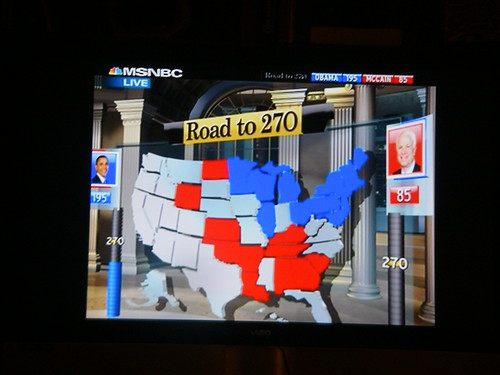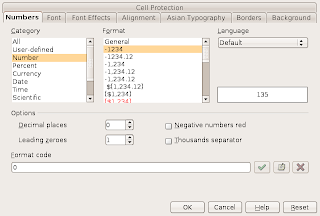[these are notes, so someday I can tell my grandkids what it was like as part of the Obama campaign]
I started following the Obama campaign during the primary season, in the days leading up to the Pennsylvania Primary. A Democratic Primary campaign that was expected to be a lock for Sen. Hilary Clinton had turned interesting, with the first two contests split between Sen. Clinton and Sen. Obama. Sen. Clinton's big push was against Sen. Obama's inexperience, proclaiming that when the primaries were over, Sen. McCain and the Republicans would launch into a no-gloves smearfest, and Sen. Clinton could handle it while Sen. Obama could not. She predicted that the Republicans would leave no stone unturned, or distorted, to make these attacks. And since the Republicans have been smearing her for 10 years, the Democrats already knew she could survive.
As part of these attacks, Sen. Clinton's campaign brought up the Reverend Jeremiah Wright. A veteran, with a tour in the Marine Corps, then a tour in the Navy during the Vietnam war era, Rev. Wright was Pastor of Trinity United Church of Christ, which is where Sen. Obama accepted the Christian faith and became part of a christian community. Rev. Wright was also known for his fire and anger at the United States with all of its injustices. And Sen. Clinton attacked Sen. Obama for this.
Sen. Obama had two options. He could ignore the attack, hoping it would not stick. Or he could forsake his pastor, denouncing Rev. Wright's views. He decided something different. He acknowledge the hate of his pastor, then denounced it, stating that it acknowledged truth, but denied what America could be. And, in Philadelphia, he presented a vision for an America that could be ("More Perfect Union"), completely in keeping with the themes of his political life.
I ended up voting for Obama in the primary, then connected with the campaign. Months later, as Sen. Obama began winning more primary contests, and the Sen. Clinton campaign died down, the Obama campaign in Pennsylvania started up again, looking towards the national election.
I live in the North Hills, affluent north suburbs of Pittsburgh. The area is heavily conservative. In addition, the entire southwest Pennsylvania region is striking in its insularity and lack of diversity, visible to anyone who has to work with the region as a whole (my experience is with public safety and emergency services). And with a multi-racial candidate, this was shown to be an issue with whisper campaigns and unattributed e-mails that circulated throughout the primary season.
I first started with voter's registration in Cranberry, then in the North Hills. The local field organizer for Butler County (a student from California taking a semester off), as part of our introduction, explained that it was never expected that Butler County would vote for Obama. But the goal was to cut into its dominance, and let the Butler Republican Party know that the Democrates would work in Butler County. The field organizer for the North Hills (recent graduate, taking time off before starting a teaching job in PA where he grew up) said the same. For Pennsylvania, it could be expected the Democrats would dominate Philadelphia and the city of Pittsburgh, the Republicans would dominate central PA. The question would be the ability of the Democrats to develop support in the Philadelphia and Pittsburgh suburbs. And as campaign volunteers in the north suburbs of Pittsburgh, we would see it all.
Voter's registration went on during the remainder of the summer. It was good natured, especially in dominantly Republican Butler County. We probably registered as many Republicans as Democrats in Cranberry. But the point was to make a presence, and let people know that Democrats were not stand-ins for the devil (which was a serious issue there.)
By late-July, the North Hills team was started with a field organizer who grew up in the North Hills, and a few couples who would serve as volunteer organizers, dividing the six townships in northern Allegheny County. We continued voter's registration, but as Obama reached the point that he won the Democratic nomination, we started calling voter's and canvassing (knocking on doors), asking them about their views on Obama and McCain, recruiting volunteers from supporters and talking to Clinton supporters, encouraging them in their support of Clinton and the Democratic Party in the runup to the Democratic National Convention. And we laid the groundwork for a bigger organization to come. From a group that started in late July at about 20 volunteers for the six townships in the North Hills, it was expected to multiply ten-fold after the convention.
Right after the convention, and after going to a rally in Beaver County with Obama and VP-Candidate Sen. Biden, I left for three weeks to volunteer in Texas and Louisiana in response to Hurricane Gustav and Ike. The volunteer coordinator for Franklin Park/Marshall teases me for being so lazy to leave the campaign in September.
When I returned, the campaign was a buzz of activity. The campaign had a North Hills office, right off McKnight Road (the big commercial road for the North Hills) There were always volunteers there on the phone, with extra ones for the evening. There were now two additional staff. Of course, this was after the Republican Convention. With the standard convention bounce, polls considered the race even. Which was expected as Sen. McCain was the only Republican who was different enough from the Republican party to have a good shot at the middle. And while the conservative wing of the party, especially those who spoke for evangelical christians, openly disliked him, having Sarah Palin as candidate for VP gave them cause to embrace and support the Republican candidates. With so many volunteers, I elected to canvass when I had time, because I was comfortable with going around, knocking on doors of strangers, even if I was alone. Because I figured the North Hills of Pittsburgh did not compare to Afghanistan or a disaster area.
Knocking on doors had lots of responses. There were the houses with Obama supporters who asked "are there other Obama supporters here?" The houses where people said "good work" and "good luck". Old ladies who were so delighted to have someone that came to talk to them. People who were delighted to have a Presidential campaign contact them and wanted to help in any way. Veterans who did not support Obama, but when learning I was in Afghanistan, we would greet each other as brothers. There were people who wanted to talk about health care, or taxes or the economy. We would usually have a few fact sheets and specific issues. And the Obama-Biden campaign would posts videos on YouTube about issue areas as well as current campaign speeches by the candidates and supporters around the country. One day Caroline Kennedy Schlossberg (daughter of John F. Kennedy) came by to give us a pep talk and join us canvassing. And so many people who asked "do you think he (Obama) has a chance?" (my reply "he has a chance, but we have work to do.") The most memorable conversations were a few mothers of soldiers or soon to be soldiers. We spent alot of time talking about Afghanistan, and why I thought that Obama would be a good commander-in-chief for their children. Several asked if Obama would get us out of the war. Of course, unlike some candidates, Obama does not promise a unilateral, immediate pullout. But I could tell them that he will use the military appropriately, and he will also bring other aspects of national power (DIME) to bear, not just the military.
And the campaign also posted McCain-Palin ads and recordings of campaign phone calls. The McCain-Palin campaign had made the choice to go almost all negative, to the point where their campaign site had only the briefest of outlines of their position and platform. There were the houses where they heard from church that Obama was a Muslim (Obama is a church going Christian, there is no Muslim in the world who would call Obama a Muslim. If Obama was not Christian, he could not be attacked on the basis of his pastor.) There were those who asked if he worked with terrorists (based on being part of a Republican organized board to improved schools in Chicago. The Republican organizers included a former member of the 60's radical Weather Underground.) Others were told he went to school in a madrassas (He went to public schools in Indonesia. And the ones that wondered if he was indeed a citizen and truly eligible to be President (Barack Obama was born in Hawaii. Sen. Obama had earlier in the year prepared a memorandum that supported that the Panama Canal-born John McCain was considered 'natural born citizen' as opposed to one who citizenship was conferred to ensure McCain's citizenship would not be an issue during the Presidential campaign.) And there were the people who would slam the door in any Democrates face. During this time these views were being promoted on radio shows, automatic telephone calls and email campaigns. All of which the Obama-Biden campaign would make available on the internet so we could address the smear campaign.
By the week before the election, the weekend canvassing was too big to work out of the Obama campaign office, so we staged out of the local congressional campaign office. Then we used staging areas at the volunteer coordinators (three for the North Hills). The weekend before the election, 200 volunteers had canvassed in the North Hills at some point. While McCain was 'guarantee victory', the Obama campaign was preaching "Don't let up" And we did not. With that many volunteers, we were meeting each other all over the place. Over the weekend I took four shifts. I saw three other groups of Obama canvassers, two groups with SEIU (a union that was supporting Obama) and a group supporting Republican Congressional Candidate Hart. And I know that there was at least one group with Democratic Congressional Candidate Altmire around me as well. There were thanks and encouragement from Obama supporters and those who did not want to say who they supported, and heckles from McCain supporters. On Saturday night there was a big volunteer conference call, that included Sen. Obama himself giving a pep talk to the volunteers over the phone. ( *ring ring* this is the Obama campaign. Please hold the line for a few minutes for a conference call with Sen. Obama.)
The last day was election day. After voting, I spent the rest of the day knocking on doors, checking if people had voted. It was just like the old school Chicago precinct captain election day ritual of walking around the neighborhood to make sure people had voted. There were packets of walk sheets that the volunteer coordinator house. People were dropping off food, snacks and drinks for the volunteers, and others were standing by to provides for anyone who needed it.
And then the wait. Everyone had discounted polls talking about 15% advantage for Obama in PA, preferring to focus on all of McCain and Palin campaigning in the area, and our memories were of when PA was considered even. I took the time off to go home and rest. And around 8:30 my wife and I went back to the volunteer organizer's house to watch the results. The next couple hours went from casual acceptance to astonishment. Many of the states were pretty well known. Pennsylvania was the first shock, because we almost did not believe that Obama would be that much ahead to call so early (Obama ended up winning by 10%). We discounted almost every piece of news before 9PM. There was Indiana not being called for either for the longest time. The announcement that Democrats swept the New England congressional races. Obama winning New Mexico. Colorado still being in contention. Then Ohio being called for Obama. And after the unified media had Obama at 200 electorial votes, with California, Oregon, Washington and Hawaii yet to close, everyone knew that Obama would reach 270. The various network announcers were tripping over themselves dealing with the obvious (CA, OR, WA and HI were all going to be for Obama without question) without actually saying it before the polls in those states closed. Of course, everyone else could do the same math, and all the various campaign offices were calling us, sharing in the excitement without actually saying anything because it may jinx it. And then, at 11 EST, the west coast polls closed. And the six media networks (ABC, CBS, NBC, CNN, FOX, AP) all declared that Obama would win those states, and their tally had Obama over 270 electorial votes (even without Florida, Virginia, North Carolina or Missouri) And much gladness, and feeling of a job well done.
 The Day of Battle: The War in Sicily and Italy, 1943-1944 by Rick Atkinson
The Day of Battle: The War in Sicily and Italy, 1943-1944 by Rick Atkinson








